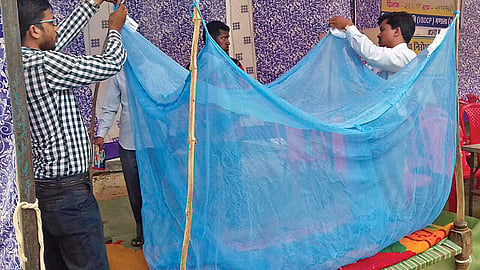Sun Pharma aims to eliminate malaria from 1,233 villages in Madhya Pradesh
In a bid to tackle the spread of malaria in India, FDEC India (Foundation for Disease Elimination and Control), a not-for-profit entity set up by Sun Pharma entered into a public-private-partnership with the Indian Council of Medical Research (ICMR) and the Government of Madhya Pradesh in 2016. Titled the Malaria Elimination Demonstration Project (MEDP), its goal is to demonstrate successfully elimination of malaria from 1,233 villages of the Mandla district in Madhya Pradesh.
This district was chosen because it provided various complexities of demographics (forest malaria, hard to reach malaria-infected communities, rural malaria, urban malaria and tribal malaria) and epidemiology. Following guidance from National Vector Borne Disease Control Programme, Ministry of Health & Family Welfare, Government of India, the project team works closely with the State Programme Officer, Chief Medical and Health Officer, District Malaria Officer, Block Medical Officers and the district VBD Consultant. In addition to malaria elimination, another objective of MEDP is to identify collateral benefits on other vector-borne diseases like dengue.
Technical and diagnostic support is provided by ICMR-NIRTH. This involves providing office and storage space for the FDEC staff, technical support for diagnosis, epidemiology, entomology, Information Education Communication (IEC)/Behaviour Change Communication (BCC), and statistical support to the project.
It also trains FDEC staff on surveillance and case investigations. Besides, technical support in the planning and execution of surveys, diagnostic support, including microscopy and molecular testing, data collection, validation and analysis, is also provided by the institute. The MEDP employs field and time tested approaches of information, education and communication, capacity building, rapid testing of infected individuals followed by prompt treatment.
The Government of Madhya Pradesh is in charge of providing Indoor Residual Spray (IRS) of houses as per the Annual Parasitic Incidence (API) and operational guidelines laid down by the National Vector Borne Disease Control Programme (NVBDCP).
Under the chairmanship of the Collector of Mandla, the project is assisted through the contribution and participation of officials of departments of forest, agriculture, tribal affairs, police, education, municipalities, panchayats and horticulture. The government has also sanctioned approvals and authorisations to conduct training, data collection and issued letters to concerned officials for extending required cooperation. Observations and recommendations by the project partners and stakeholders are recorded to be implemented in the findings/model in other districts and at the state level.
The operational side of the project is managed by FDEC India. This includes technical, management, supervisory responsibilities, active surveillance through Track, Test, Treat, and Track (T4) malaria in the district. With a view to track progress and seek expert guidance, the Foundation has constituted a Malaria Elimination Advisory Group (MEAG) comprising malaria and public health experts. It also procures and pays for medicines and other equipment as per the NVBDCP guidelines. The project witnessed challenges in terms of capacity building of the existing system to ensure successful replication of the initiative. Despite these challenges, the MEDP focused on its priority and maintained a vertical trajectory aimed at achieving the desired results of the project along with regular training of the existing district health staff of the state government.
The Foundation is also responsible for updating and submitting reports to all stakeholders including DG ICMR, District Collector, Commissioner & PS Health, Government of Madhya Pradesh, MEAG, etc. It uses social media and web-based tools for community outreach, develops new tools for IEC/BCC, disease surveillance, etc.
A comparison of surveillance data compiled for September to March (seven months) in two annual cycles (2017-18 and 2018-19) shows that malaria cases recorded in Mandla have come down 60 per cent. If indigenous malaria cases (cases originating in Mandla) are looked at in the same period, the reduction is 90 per cent. On achieving zero indigenous cases, MEDP plans to hand-over the project to the state of Madhya Pradesh and also proposes to launch a cost-effective business plan for scaling-up the malaria elimination drive.

